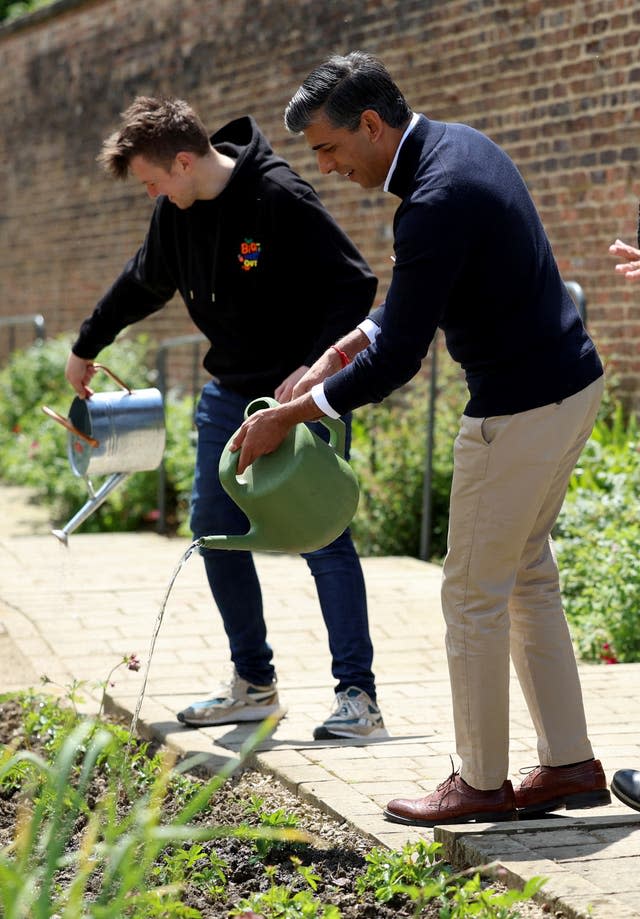Labour talk tough on law and order as Tories seek to move on from D-Day debacle

The Labour Party is talking tough on law and order and vowing not to hike taxes, as the Tories seek to move on from Rishi Sunak’s D-Day debacle with a benefits overhaul plan.
Sir Keir Starmer’s party has pledged to crack down on the antisocial use of off-road bikes and relieve pressure on overstretched prisons.
Police will be given new powers to scrap noisy dirt and quad bikes within 48 hours, instead of having to keep them impounded for two weeks, if Labour wins the General Election.
The Labour leader and shadow home secretary Yvette Cooper are expected to promote the plans on a visit on Sunday.

The party also promised to deliver 14,000 more prison places as it blamed Conservative inaction for the prison estate “bursting at the seams”.
Classifying prisons as sites of national importance so ministers can take control of planning decisions would stop the “powder keg waiting to explode” behind bars, shadow justice secretary Shabana Mahmood said.
The Tories hit back that they are already “overseeing the largest expansion to the prison estate since the Victorian era”.
Labour’s manifesto this week will also comprise pledges to set up 80 new specialist rape courts across and England and Wales, introduce specialist rape units in every police force, and introduce laws to crack down on violence against shop staff, according to Sunday newspapers.
And in a bid to kill off the Tories’ much-disputed claim that Labour would hike taxes by £2,000, Sir Keir will include a cast-iron pledge in the manifesto not to raise income tax, national insurance or VAT for five years, The Sunday Times reported.
Meanwhile, the Conservatives are attempting to put a lid on the fallout from the Prime Minister’s early return from D-Day commemorations.
Work and Pensions Secretary Mel Stride will tout a Tory pledge to halt the rising costs of welfare by reforming the benefits system on the Sunday morning broadcast round.
The party claims it would help save some £12 billion a year by the end of the next parliament, although the Institute for Fiscal Studies (IFS) said this “looks difficult in the extreme” as the measures have been previously announced and have therefore already been incorporated into the Budget forecasts.
Those already floated measures include a £700 million investment in NHS mental health treatment, a pledge to reform the disability benefits system and a tightening of the criteria for work capability assessments.
Mr Sunak said: “Work is a source of dignity, purpose and hope and I want everyone to be able to overcome whatever barriers they might face to living independent, fulfilling lives.”
But a Labour spokesperson said: “These reheated pledges, old policies and vague promises will not get Britain healthy or benefits under control.”
IFS associate director Tom Waters said most of the measures are existing government policy and “cannot be expected to deliver reductions in spending relative to the latest forecasts, since those forecasts are already predicated on most of these policies happening”.
He added: “Delivering an additional £12 billion saving from this set of measures relative to what was forecast in the March Budget looks difficult in the extreme.”

The Prime Minister is campaigning in Yorkshire without media on Sunday after facing accusations of “dodging” reporters’ questions the previous day amid continuing criticism over his D-Day snub.
Mr Sunak, whose already challenging battle to stay in No 10 was dealt a further blow by the fiasco, told The Mail on Sunday “we all make mistakes”.
In the interview on Friday, at the peak of the storm over his premature departure from Normandy, he told the newspaper: “I haven’t had many days where there hasn’t been something difficult going on.
“So you’ve got to have an inner strength and resilience. We all make mistakes. We’re all human. But I’m motivated to do what I can for this country to the best of my ability, and that’s what keeps me going.”

As his party hopes to detract from the row, Energy Secretary Claire Coutinho attacked Labour’s pledge to convert Britain to clean power by 2030.
She told The Sunday Telegraph that if Labour were to achieve its aim to decarbonise the grid by then “it would either be through enormous costs, or it would risk blackouts in this country”.
The Tory manifesto will include a pledge to reform the remit of the official climate watchdog so it is forced to take account of the cost to households and the effect on energy security when advising ministers on carbon targets, according to the paper.
Elsewhere, the Liberal Democrats are vowing to tackle ambulance delays as they turn their attention to health and care.

The party’s manifesto pledge features an upfront capital investment of £280 million to expand urgent treatment centres and A&E wards, and an additional £400 million a year to add an extra 1,000 staffed beds in hospitals.
The King’s Fund said “it is a plan for incremental improvement, not rapid recovery” as the “amounts of money set out in this announcement are relatively modest and wouldn’t ‘fix’ the urgent and emergency care crisis in isolation”.
North of the border, Scotland’s First Minister John Swinney urged Labour to “be open with voters and admit” where £18 billion in cuts predicted by the IFS will come from.
The think tank has previously said tough decisions will be required after the election after it warned the latest Budget implied a real-terms cut to net public sector investment of around £18 billion between 2024-25 and 2028-29.
In a letter to Sir Keir, the SNP leader describes Labour’s intentions as “planning to take the axe to public services as a result of being wedded to Tory fiscal rules and a growth-destroying Brexit”.
Shadow secretary of state for Scotland Ian Murray insisted “there will be no return to austerity under Labour”.
Ahead of campaigning in Edinburgh on Sunday, Mr Murray said the SNP’s General Election campaign is “built on empty rhetoric” and accused his opponents of “butchering” the country’s public services.


